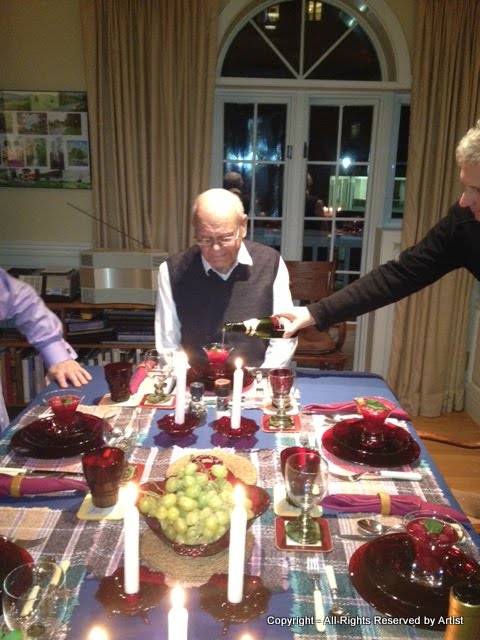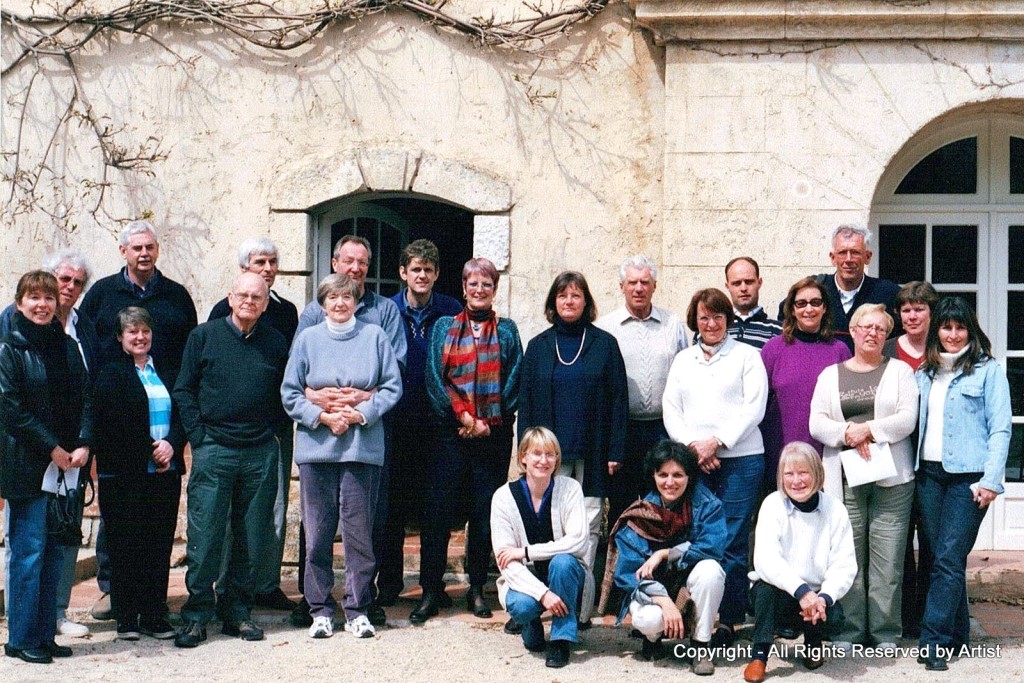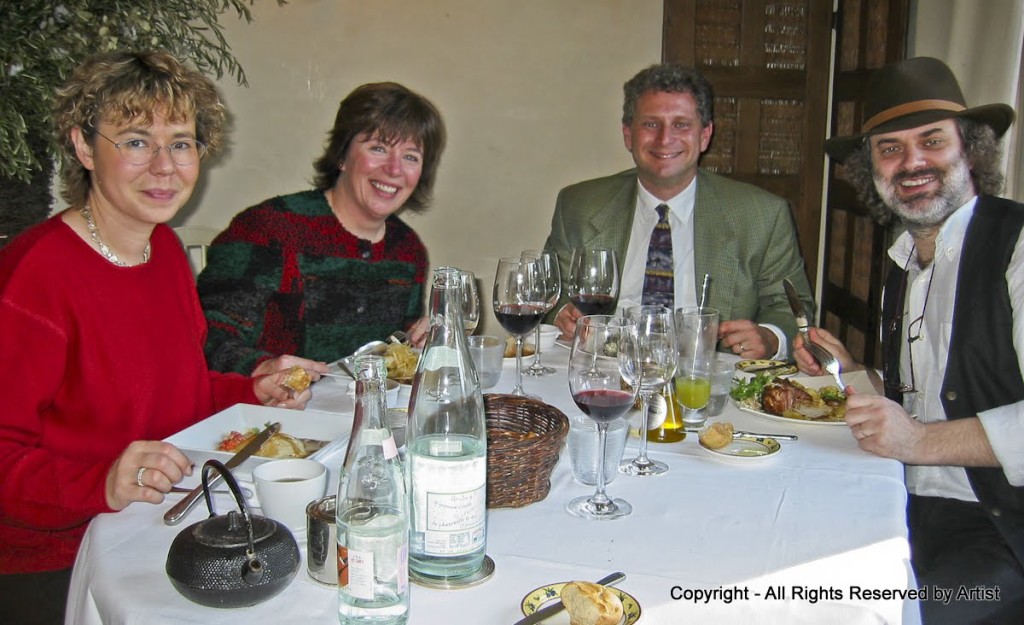
It doesn’t matter where you were when 2012 rolled into 2013 or how you welcomed the New Year–quietly or with great fanfare—if you are lucky enough to be alive as another year begins, embrace it. It is a gift.
I prefer a quiet New Year’s Eve. Even a little solitude. It gives me a chance to reflect on the past year and plan for another. What worked well? What do I wish I had done differently? How shall I approach the New Year to make the most of it?
Inevitably, I put pen to paper and record my New Year’s resolutions, thereby breathing life into what might otherwise remain ethereal visions. I have done this every year for as long as I can remember.
I also knew that resolutions would be the subject of discussion around the New Year’s Eve dinner table and I wanted to be able to make a public commitment. Nothing goads one into action more than revealing to others what one has resolved, in private, to do (even if there are only four other people around the table).

Our quiet dinner party was hosted by our good friend Brian, an English man I met nearly ten years ago in a… French immersion class (CREA Langues) in Moustiers-Sainte-Marie, about an hour and a half from Lourmarin. To keep us fully immersed in French, we were strictly forbidden from speaking anything other than French; well, there were no guillotines in the courtyard, but peer pressure kept anyone from reverting to his or her native language.

For me, with my French largely limited to first person, present tense sentences, it is actually amazing that we ever even got to know one another. Nevertheless, a friendship was forged that, years later, would set the stage for Brian, at 81 years old, to sell his homes in New York and move to Portsmouth, New Hampshire where he was now about to host a dinner party on New Year’s Eve.
Somewhere between the curried black bean soup and the beef with mushroom gravy (served with a lovely Bourgogne Passe-Tout-Grains), resolutions surfaced and they continued through the dessert course of lemon butter crêpes and into the living room where we sat around the fire (with Piper-Heidsieck Champagne). Only the occasional cork popping from another bottle of wine diverted our attention.
With more years logged in than there are left to live, how we spend our remaining years takes on much greater importance. There is no time to waste. To be healthy and happy probably sums up the list. But how to attain health and happiness is an individual choice.

For me, in 2013, I am going to write more, practice French more, and have more dinner parties. I am also going to play more squash and—drum roll—train for a 10K called “Marathon de Provence Luberon,” held in Pertuis (about 20 minutes from Lourmarin) on October 6, 2013. I don’t know what ensures health and happiness, but I think these resolutions will contribute to both.
Writing my posts gives me great pleasure. Thanks to those of you who let me know that you have missed The Modern Trobadors in recent weeks. I am excited to be back at the key board and have lots of topics to cover: more about wine—including a tidbit about George Clooney buying a château near the famous Pitt-Jolie château—restaurants, markets, artists, French lessons, and the Luberon Vaudois, to mention just a few subjects.
Are you still looking for a public forum to reveal your resolutions? Let us all know here!
Still looking for inspiration for your resolutions? I will leave you with this short video—What Do You Desire?–narrated by British philosopher Alan Watts.






Organizing: Targets vs. Goals – PART 1 OF 2
It's traditional at the beginning of the year to define what you'd like to achieve in the coming twelve months.
That's a good thing and I highly recommend it. This
week I'll be writing my own annual plan for the coming year.
However, I'd like to point out an area where just about everybody uses fuzzy thinking in their planning.
We don't control our future entirely.
Some things we can control, of course. But some we just can't. It's crucial to know the difference.
If you're looking for an agent, you have complete
control over how many queries you send out. But you
can't force an agent to agree to represent you. All you can do is make yourself an attractive client, send out those pesky queries, and hope that one of the agents sees how brilliant you are.
What we need are two different words, one for goals
that we can control, and one for goals that we can't. As far as I know, we don't have those words. We could make some up, but I don't think that's necessary.
Instead, let's just define a "Goal" (with a capital
letter) to be something we have control over, and let's define a "Target" to be something we only have partial control over.
PART 2 of 2
"I will write 10,000 words every week" is a Goal.
"I will become the best writer in my critique group" is a Target.
"I will attend one major writing conference this year" is a Goal.
"I will get two editors at conferences to request
manuscripts" is a Target.
"I will send out 20 queries to agents in March" is a
Goal.
"I will sign with an agent by July" is a Target.
Goals are good. Targets are also good. But they're not the same thing.
You can make a list of Goals for the year that is 100% achievable. At the end of the year, if you haven't reached all those Goals, then you have a right to hold yourself accountable.
You can make a list of Targets for the year, but you
just can't assume they're achievable. It's OK if
they're a bit of a stretch. It's OK to aim for a
spectacular year and end up with a merely great year. (For some people, the only way to achieve their best is to shoot for the impossible.)
But it's a mistake to confuse Goals with Targets. That only sets you up for self-flagellation at the end of the year, if you don't reach all your Targets.
An important point is that Targets usually depend on
Goals. So set your Targets first. Then figure out what Goals you must meet in order to make your Targets as likely as possible.
Let's see how that works out in practice. Suppose one of your Targets is "I want to sign with a major agent this year."
If you're a first-time novelist, then you probably
can't get an agent unless your manuscript is complete and polished. You also can't get an agent unless you pitch to at least one (and probably several).
So here are five reasonable Goals you can set in
support of your Target:
* I will complete my manuscript by the end of March.
* I will hire a professional freelance editor to
evaluate my manuscript, with a deadline to get the
evaluation back to me by the end of June.
* I will polish my manuscript to the best of my ability by the end of August.
* I will send out a minimum of 10 queries to suitable agents in September.
* I will attend a writing conference in September or
October and pitch my work to two suitable agents.
Now if you hit all five of these Goals, there is no
guarantee that you'll sign with an agent. But the odds of signing with an agent are vastly higher if you achieve all five of these Goals than if you achieve none of them.
Targets depend on Goals. But Goals don't guarantee
Targets.
Here is a five-minute exercise that you can do right
now to create a reasonable set of Targets and Goals:
What are your Targets for the coming year? A good
Target is concrete, objective, and difficult. But it's not necessarily achievable. There is a part that depends on other people.
For each Target, set one or more Goals that depend on you alone. Goals should be concrete, objective,
difficult, and ACHIEVABLE.
Do you have any other Goals for the coming year
(besides the ones you need to reach your Targets)?
Write down all your Targets and your Goals and post
them above your workspace. Make it clear which Targets depend on which Goals.
Look at your Targets and Goals every day before you
start work. If you need to revise your Goals throughout the year, that's OK. It's fine to be flexible. If a great opportunity comes up during the year, change your Targets and Goals to include it.
A year from now, review your Goals first and then your Targets:
* Did you hit all of your Goals? If not, then figure
out why. You may not have given yourself enough time. Or you may need to improve your work habits. Or it may be that your writing has a lower priority than other things in your life.
* Did you hit any of your Targets? If not, was it
because you failed to achieve the required Goals, or
was it outside of your control?
Planning your year doesn't need to be complicated. But it does need to be clear. You control your destiny with your Goals. You don't completely control it with your Targets.
Happy New Year!
Lin
I would say that my resolutions are less noble than most. As they are simple:
• be kind
• be nice
• be thoughtful
• be healthy
• be organized
Pretty much, for me, everything I need to do falls in one of those categories. I thought a lot about "kind" and "nice" – they sound so similar but are really very different in my eyes.
It is wonderful to see you back online, and I will look forward to your posts!
Bonne Année, mes amis!
~ David
One never knows what a desire to learn French might lead to. Brian
As you said at the begining Susan "if you are lucky enough to be alive as another year begins, embrace it. It is a gift.
These are such beautiful words that I will not add to them, thank you.
Best wishes for the New Year
Paul
My resolution is to make plans to return to Lourmarin! Your happy renter,
Henry